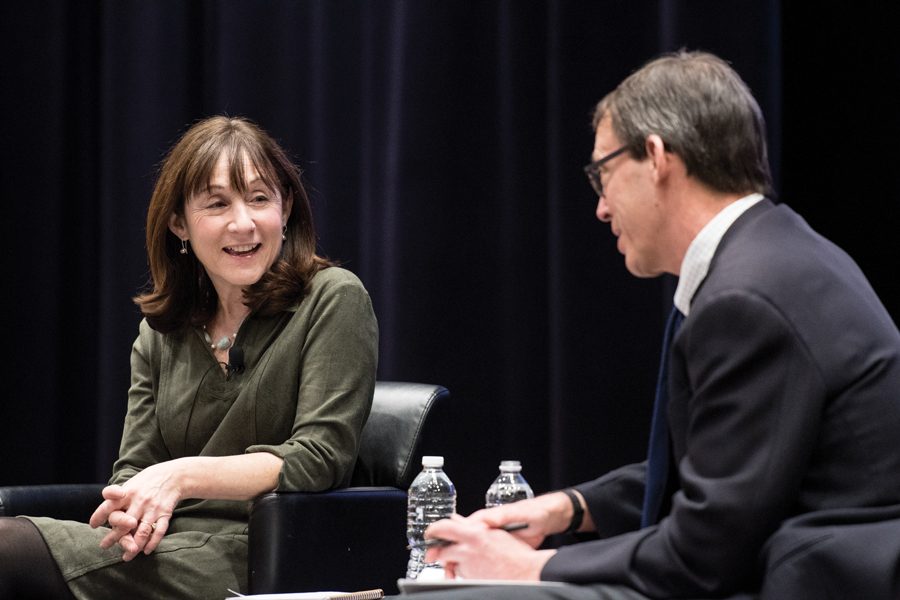Jane Mayer of The New Yorker talks journalism, truth in Trump era
Colin Boyle/Daily Senior Staffer
Jane Mayer of The New Yorker talks with Medill Prof. Peter Slevin in a Monday event. Mayer discussed the challenges journalists face in the current political climate.
January 29, 2018
When Jane Mayer of The New Yorker interviewed President Donald Trump in the summer before the 2016 election, she said he told her he “loved The New Yorker” and called it a “great publication.” Mayer then mentioned to him that Tony Schwartz, the ghostwriter for Trump’s book “The Art of the Deal,” was not planning on voting for Trump in the upcoming election, a move Trump called “disloyal.”
Mayer said just a few minutes after the interview ended, Schwartz called her, saying he had just gotten off the phone with Trump, angry with Schwartz about his vote. Trump said he had received the news from a journalist at The New Yorker, which he then called “a loser publication that nobody reads.”
“Donald Trump is baffling and exhausting and fascinating for all of us who are covering him,” Mayer said. “It’s the Dickens problem — it’s the best of times and the worst of times for reporters.”
Mayer spoke Monday in conversation with Medill Prof. Peter Slevin about the importance of the media during the Trump administration, praising the work of journalists and denouncing alternative facts. The talk, attended by about 175 people in the McCormick Foundation Center, was a keynote event of the Alice Kaplan Institute for the Humanities TRUTH Dialogues, which focus on politics and knowledge from humanistic perspectives.
Mayer is a former reporter for The Wall Street Journal and author of “Dark Money,” a book covering the rise of billionaires influencing conservative politics. She spoke about the difficulty of finding truth within the Trump administration and its mass of “truthful hyperboles,” as described in “The Art of the Deal.”
“The truth matters and it does catch up with you,” Mayer said. “One place that it may very well might catch up with him is with the Special Counsel, who is all about getting the truth. At a certain point, when you’re under oath, it’s very hard to have so-called ‘truthful hyperboles.’ You get busted.”
Mayer also elaborated on the subject of her book and the influence billionaires like Charles and David Koch and the Mercer family have on democracy.
She described a time when the Koch brothers, in response to an investigative piece she had released about them, threatened to have various news outlets publish allegations that she had plagiarized from other journalists. However, Mayer managed to obtain statements from those journalists disproving the alleged plagiarism, and the publications backed off from releasing the claims.
The event was co-presented by the Medill School of Journalism, Media, Integrated Marketing Communications. Jessica Winegar, the interim director of the Kaplan Institute, highlighted Northwestern’s role in the discussion of truth.
“Medill is training the next generation of media makers and journalists whose primary challenge will be how to think about and find truth in this internet era of bots and tweets,” Winegar said.
Laura Mandell, a North Barrington, Illinois, resident who attended the event, said she is deeply supportive of journalists like Mayer who take the time to invest themselves in a story.
“It’s just insidious what’s happening in society.” Mandell said. “So it’s such a critical role that the journalist plays to help us all be aware of what’s really going on and what’s really important.”
Email: [email protected]
Twitter: @charwalsh_












